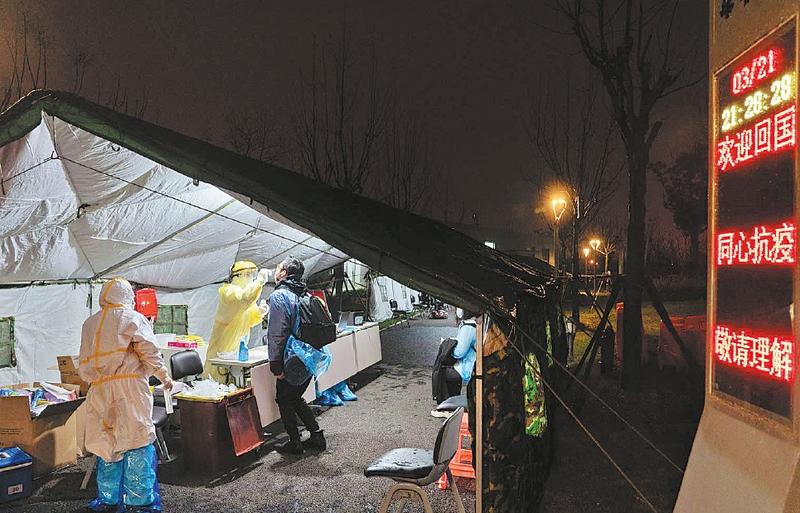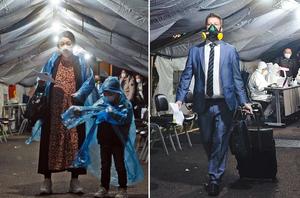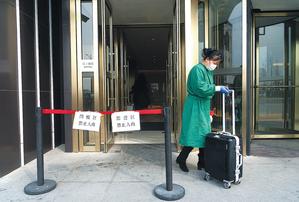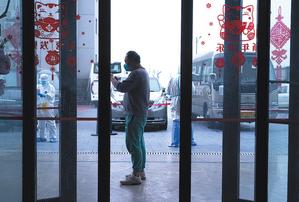Travelers undergo stricter health checks
 A passenger undergoes nucleic acid testing in a makeshift tented clinic at a park in Changning district, Shanghai. (GAO ERQIANG / CHINA DAILY)
A passenger undergoes nucleic acid testing in a makeshift tented clinic at a park in Changning district, Shanghai. (GAO ERQIANG / CHINA DAILY)
Nearly 10 hours after landing at Shanghai Pudong International Airport on Saturday, a woman from the city, surnamed Wang, her daughter and 2-month-old grandson finally arrived at a park in Changning district, where her home is also located.
The three arrived in Shanghai after setting out from Houston in the United States and changing planes in Los Angeles.
They underwent epidemiological investigation by customs officials at the Shanghai airport. They also took nucleic acid tests for the novel coronavirus at a temporary clinic set up in a tent at the park and waited for up to eight hours for the results.
After testing negative, they were escorted home in designated vehicles by neighborhood committee workers to start 14 days of quarantine, as the US had been listed by Shanghai authorities as one of the 24 countries severely affected by the pandemic.
"It was a long and tiring journey," said Wang, who is in her late 50s and has spent the past five months living with her daughter in Houston. "But from another perspective, this was exactly why we chose to return at this time, to reassure ourselves about our health."
On Tuesday, Beijing ordered all arrivals from overseas to be quarantined in hotels and to undergo nucleic acid test starting on Wednesday as the number of imported cases continued to rise in the city. China reported 74 new confirmed cases on Monday, 31 of them in the capital.
Zhejiang province said on Monday that all arrivals from overseas, including those who entered the country via other provinces, must be quarantined in hotels and undergo testing. By midnight on Monday, Zhejiang had not reported any confirmed domestic cases for 31 days, but 23 people with the virus arrived from Italy, Spain, the United Kingdom, Switzerland and other countries and regions.
 Arrivals in Shanghai wait to be tested at the makeshift clinic in Changning district (left); Nicholas Oettinger from Australia arrives at the clinic (right). (GAO ERQIANG / CHINA DAILY)
Arrivals in Shanghai wait to be tested at the makeshift clinic in Changning district (left); Nicholas Oettinger from Australia arrives at the clinic (right). (GAO ERQIANG / CHINA DAILY)
All arrivals at entry points in Shenzhen, Guangdong province, which borders Hong Kong, have to undergo nucleic acid testing and be quarantined at home or in a hotel for 14 days. The order also applies to those arriving in Guangzhou, the provincial capital.
Wang's husband and son-in-law, who returned to Shanghai two weeks earlier, said the measures to curb the spread of the virus in the city, including quarantine at homes and hotels, were strict and serious, so they had no hesitation in following them.
The measures taken in Shanghai to curb the spread of the virus from overseas were implemented on March 6, before the World Health Organization declared the COVID-19 outbreak a pandemic five days later. Travelers from four countries were initially subject to epidemiological investigation by customs officials and 14 days' quarantine.
As of Friday, the number of countries subject to such measures stood at 24. Travelers from the 24 countries were taken to their homes or hotels for 14 days' quarantine if test results were negative, while those from other countries could leave unescorted if they tested negative.
Since Monday, all arrivals in the city have been subject to epidemiological investigation and nucleic acid testing.
Front-line medical workers said the intensified efforts to prevent the virus being spread from overseas mean the number of travelers undergoing epidemiological investigation and nucleic acid testing will at least double. They reminded travelers that the entire procedure from landing in Shanghai to getting to their home or a hotel may take more than 24 hours.
In Beijing, all inbound flights are being redirected to 12 airports nationwide, including Shanghai Pudong International Airport, and this may also result in longer waiting times to complete the procedure.
On Monday, nine new infections were detected among travelers arriving in Shanghai, accounting for more than 12 percent of the total in the country. A total of 427 imported cases had been reported on the Chinese mainland by midnight on Monday, according to the National Health Commission.
Many of Shanghai's 16 districts are considering allocating more quarantine hotels and building new venues for nucleic acid testing. In Pudong district, home to Shanghai Pudong International Airport, the number of such hotels has risen from 20 to 30 in the past week.
'I had no option'
Nicholas Oettinger, an Australian, spent two days flying to Shanghai from the Sunshine Coast in his country. He changed planes in Singapore, where he learned before boarding his flight to Shanghai of the latest measures taken by the city authorities.
"I had no option. I needed to return to Shanghai for work. In addition, if I returned to Australia, I would need to observe 14 days' quarantine as well," said Oettinger, who has been in China for 13 years.
 A worker disinfects the luggage of a guest quarantined at a hotel near Shanghai Hongqiao International Airport. (GAO ERQIANG / CHINA DAILY)
A worker disinfects the luggage of a guest quarantined at a hotel near Shanghai Hongqiao International Airport. (GAO ERQIANG / CHINA DAILY)
Working as an engineer at a company manufacturing glass windows and doors, he said that like most travelers on the flight to Shanghai, he did not eat or drink, as he dared not take off his mask. He added that the back three rows of seats were empty and had been set aside for anyone developing a fever or cough.
Oettinger said that after landing, the arrivals remained on the plane for three hours as customs officers and disease control workers boarded the aircraft to check their health declaration forms. Arrivals had to state their travel history in the past 14 days and also had their temperature taken twice.
On Monday, such checks were widened to all inbound flights.
Airport workers said any passenger found with obvious symptoms of the virus before disembarking would be sent to a designated hospital by ambulance.
Wang, the arrival from Houston, said she saw an ambulance take a passenger from a plane parked in front of the aircraft she was on.
When arrivals enter the terminal, medical workers carry out epidemiological investigations, including potential contact history with confirmed cases of COVID-19. The travelers' temperatures are then taken again before their health declaration forms are checked.
Anyone running a fever or showing symptoms of respiratory disease is taken for medical screening in the terminal.
Zheng Yilin, 32, a front-line worker at the airport, said: "Customs officers will also double-check the travel history to avoid omitting anyone appearing to have arrived from a point of departure not on the list of the 24 countries.... Some passengers have eventually arrived in Shanghai by making up to five transfers after many direct flights were canceled." Zheng added that the checks take about three hours.
Based on their residential address, passengers are then directed to booths set up at the airport by officials from Shanghai's 16 districts.
Zheng, from the Huangpu District Procuratorate, said, "We verify their information and notify the residential committee workers to carry out checks to see if the arrivals' homes meet the quarantine requirements."
On Sunday, these requirements were upgraded. Travelers are quarantined at home if they are the sole occupants of a residence, or if those living at the same address also agree to be quarantined for 14 days. Otherwise, an arrival has to be quarantined at a designated hotel.
Zheng said the procedures at the airport are time-consuming, but travelers have shown an increased willingness to cooperate. "So far, no food or drink has been arranged for passengers, but when we see seniors, children and pregnant women, we give our bottled water and lunchboxes to them," he added.
 Medical workers check the health details of travelers arriving at the hotel to be quarantined. (GAO ERQIANG / CHINA DAILY)
Medical workers check the health details of travelers arriving at the hotel to be quarantined. (GAO ERQIANG / CHINA DAILY)
Improved service
On completion of procedures at the airport, travelers are taken to designated venues-currently one in each district-to undergo nucleic acid testing.
Ji Guanzhong, a worker at the testing venue in Changning district, said it is located in a park, as open-air venues are preferred to keep travelers and workers safe. The park is yet to open
On arrival at the venue, travelers place their luggage in a storeroom before being escorted to a large tent to be tested. They rest in a spacious room while awaiting the results. During the day, many prefer to sit outdoors on the lawn or on benches.
Since Sunday, all elderly arrivals, pregnant passengers and those with babies have been escorted to quarantine hotels while they await test results. Previously, such arrivals were taken to separate rooms at the testing venue to rest, while all the others relaxed in a large room.
Ji said all travelers are provided with a simple meal, biscuits and bottled water while they rest. They can obtain more supplies on request.
Front-line workers have noticed a rising number of inbound travelers, both Chinese and expatriates, are arriving with their families. "In contrast to travelers who arrived on their own early this month, more are now landing with spouses, partners and children," Ji said.
A woman, surnamed Gao, and her husband, who works in the finance industry in London, were waiting for results at a testing venue after returning to Shanghai.
"We were lucky to buy tickets for a direct flight for 10,000 yuan (US$1,400) two weeks ago. There is now a scramble for tickets costing as much as 45,000 yuan," Gao, 30, said.
She added that the couple's purchases of daily necessities in London, including food, had been affected by the outbreak. "Vegetables and meat in supermarkets often sold out and it took 10 days for online deliveries to arrive."
The couple is also concerned that most people in London are still not wearing face masks. "I tried very hard to buy masks, but could not find them in stores," Gao said.


